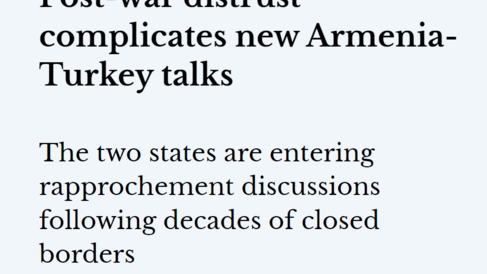
Dr Hrag Papazian is one of seven Visiting Scholars participating in our Turkish-Armenian Relations project (funded by the Calouste Gulbenkian Foundation). Writing for Open Democracy(12 Jan 2022), he identifies how recent conflict between Armenia and Azerbaijan has affected Armenia's take on new talks with Turkey.
Post-war vulnerability* complicates new Armenia-Turkey talks
The two states are entering rapprochement discussions following decades of closed borders
[Dr Hrag Papazian writes:] After decades of closed borders and no diplomatic ties, Turkey and Armenia recently unveiled a new dialogue process. Special envoys appointed by the two sides are expected to hold their first meeting in Moscow on 14 January.
For around 30 years, borders between the two countries have been closed. Turkey sealed its border with Armenia in 1993 in solidarity with Azerbaijan over the Nagorno-Karabakh conflict. Now, having assisted Azerbaijan in militarily defeating Armenia in Nagorno-Karabakh in the 2020 war, Turkey appears confident and eager to propel the talks, driven by its broader regional aspirations and the need for a positive agenda item.
But Armenia’s stance is rather ambivalent. Turkey’s support for Azerbaijan during the war has left Armenian society with an increased sense of vulnerability and mistrust towards its eastern neighbour — a fact that could impact the current talks.
A previous attempt at a rapprochement process in 2008-09 came to nothing, and Turkey largely returned to its ‘absent’ or, at best, ‘distant’ status in the minds and geopolitical imaginations of average Armenians. As my research conversations suggest, until 2020, Turkey held the position of a historical enemy in Armenia – and was rarely perceived as an actual contemporary threat.
Read the remainder of Dr Papazian's Op Ed on Open Democracy.
*The title given above reflects Dr Papazian's analysis, supported by discussion with other researchers in the project. The original piece published by Open Democracy specifies "distrust" rather than vulnerability.
